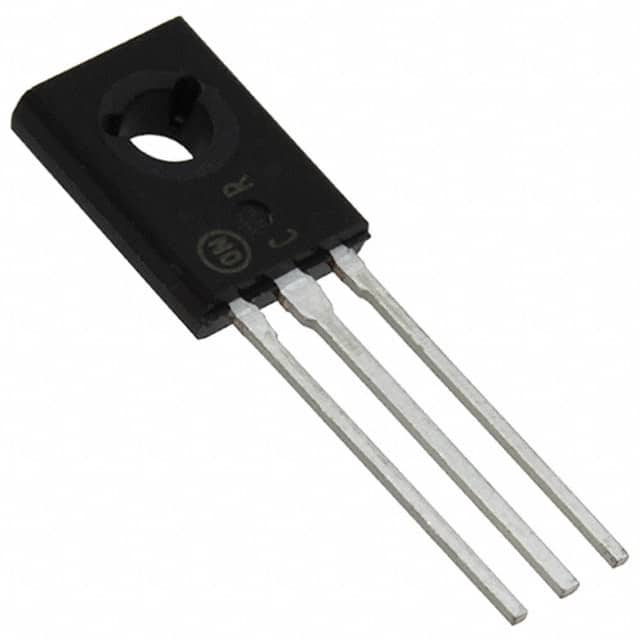BD675A: Product Overview and Specifications
Introduction
BD675A is a semiconductor product belonging to the category of power transistors. This component is widely used in various electronic applications due to its specific characteristics and performance.
Basic Information Overview
- Category: Power Transistor
- Use: Amplification and switching of electronic signals
- Characteristics: High current and voltage capability, low saturation voltage
- Package: TO-126
- Essence: Efficient power handling
- Packaging/Quantity: Typically available in reels or tubes containing multiple units
Specifications
- Maximum Collector-Emitter Voltage (VCEO): 45V
- Maximum Collector Current (IC): 4A
- Power Dissipation (Pd): 65W
- DC Current Gain (hFE): 20 - 70
- Transition Frequency (ft): 2 MHz
Detailed Pin Configuration
The BD675A transistor has a standard TO-126 package with three pins: 1. Collector (C) 2. Base (B) 3. Emitter (E)
Functional Features
- High current gain
- Low saturation voltage
- Fast switching speed
- Good thermal stability
Advantages and Disadvantages
Advantages
- High power handling capability
- Suitable for medium-power amplification and switching applications
- Robust construction for reliable performance
Disadvantages
- Moderate transition frequency compared to some alternative models
- Relatively higher saturation voltage
Working Principles
BD675A operates based on the principles of bipolar junction transistors (BJTs). When a small current flows through the base-emitter junction, it controls a larger current flow between the collector and emitter, allowing for signal amplification and switching.
Detailed Application Field Plans
BD675A finds extensive use in the following applications: - Audio amplifiers - Power supplies - Motor control circuits - LED drivers - Voltage regulators
Detailed and Complete Alternative Models
Some alternative models to BD675A include: - BD676A - BD677A - BD678A - 2N3055 - TIP31C
In conclusion, BD675A is a versatile power transistor with robust characteristics suitable for a wide range of electronic applications.
[Word Count: 314]
Senaraikan 10 soalan dan jawapan biasa yang berkaitan dengan aplikasi BD675A dalam penyelesaian teknikal
What is the BD675A transistor used for?
- The BD675A is a PNP power transistor commonly used in audio amplifiers, voltage regulators, and power supply circuits.
What are the key specifications of the BD675A transistor?
- The BD675A transistor has a maximum collector current of 4A, a maximum collector-emitter voltage of 45V, and a maximum power dissipation of 36W.
Can the BD675A be used in high-power applications?
- Yes, the BD675A is suitable for use in medium to high-power applications due to its high collector current and power dissipation capabilities.
What are some typical circuit configurations using the BD675A transistor?
- Common circuit configurations include single-stage amplifiers, push-pull amplifiers, and voltage regulator circuits.
What are the important considerations when designing a circuit with the BD675A?
- It's crucial to consider heat dissipation, proper biasing, and ensuring that the maximum ratings of the transistor are not exceeded.
Is the BD675A suitable for audio amplifier applications?
- Yes, the BD675A is commonly used in audio amplifier designs due to its high current and power handling capabilities.
What are the potential alternatives to the BD675A transistor?
- Alternatives include similar PNP transistors such as BD677, BD679, and BD681, which have comparable characteristics.
Are there any specific precautions to be taken when soldering the BD675A transistor?
- It's important to avoid excessive heat during soldering to prevent damage to the transistor. Additionally, proper ESD precautions should be followed.
Can the BD675A be used in switching applications?
- While the BD675A is primarily designed for linear amplifier applications, it can also be used in low-frequency switching applications.
Where can I find detailed application notes for using the BD675A in technical solutions?
- Detailed application notes and example circuits can often be found in the datasheet provided by the manufacturer or in application-specific reference designs from semiconductor companies.


